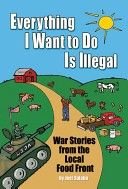 Everything I Want to Do Is Illegal: War Stories from the Local Food Front. by Joel Salatin (Polyface Inc., Swoope, Virginia, 2007)
Everything I Want to Do Is Illegal: War Stories from the Local Food Front. by Joel Salatin (Polyface Inc., Swoope, Virginia, 2007)
Until now, I've written more about Joel Salatin than I've read by him: almost a year ago in Strange Bedfellows? Not Really, and three months later in my review of The Omnivore's Dilemma. Wanting to correct that sin of omission, I grabbed the only one of his books available in our local library: Everything I Want to Do Is Illegal.
On every side, our paternalistic culture is tightening the noose around those of us who just want to opt out of the system. And it is the freedom to opt out that differentiates tyrannical and free societies. How a culture deals with its misfits reveals its strength. The stronger a culture, the less it fears the radical fringe. The more paranoid and precarious a culture, the less tolerance it offers. When faith in our freedom gives way to fear of our freedom, silencing the minority view becomes the operative protocol. — Joel Salatin
Salatin wants to opt out of a little more of the system than I do, but I hear his cry. You could call him bitter, but if you consider the miracle that is Polyface Farms, you have to wonder why our government is working so hard to stamp out such elegant, inexpensive, healthy, delicious, and truly "green" (in a conservationist sense) endeavors. (More)
Permalink | Read 5253 times | Comments (1)
Category Reviews: [first] [previous] [next] [newest] Politics: [first] [previous] [next] [newest] Children & Family Issues: [first] [previous] [next] [newest] Food: [first] [previous] [next] [newest] Conservationist Living: [first] [previous] [next] [newest]
I wasn't going to write about the two recent examples of September 11-related hysteria run amok, because (a) there has already been too much reaction, and (b) believe it or not, the fate of the world does not hinge on what I write on the Internet. But in another context I was invited to share my opinion, and you know how I love to get double duty out of the effort it takes to write.
First, the "Ground Zero mosque" flap. Whether a mosque, or Islamic center, or church, or store, or apartment building, or library, or strip club is built in New York City is none of my business. Nor is it the business of 99% of the others who have weighed in on the issue, including President Obama, foreigners, and talk show hosts. It is New York City's business, at whatever level zoning regulations are made. If the neighbors object to a proposed project, they have the right, and possibly the duty, to oppose it at zoning board hearings, to write letters to local papers, to make local speeches, to go from door to door with petitions. My opinion is irrelevant, as is that of the President of the United States. (More)
Today's Mallard Fillmore comic inspired this post, which Li'l Writer Guy had actually been working on in the background ever since a conversation we had about the subject last night.

Mind you, I don't know any of the details of how it will work, and am only commenting on the theory that children should be covered on their parents' health insurance until they are 26 years old. (More)
The Obamas' Federal income tax return for 2009 is now media fodder. (Another reason not to run for president.) They made a lot of money, though it didn't come primarily from your pocket unless you bought one of his books. But here's what I want to know: Does our president support his words with his actions?
One of my complaints about politicians is their penchant for enhancing their reputation for generosity by being charitable with other people's money. (See the Daley Ponderings discussion about Davy Crockett.) Oddly enough, the more a politician is known for wanting to spend tax money on charitable causes, the less willing he seems to spend his own money in a similar fashion—a lesson not easily forgotten if one has lived in Massachusetts. As I reported in How Much Should the Rich Pay in Taxes?,
- In 2007, President George W. Bush and his wife had an adjusted gross income of $923,807...and donated $165,660 to charity—or 18 percent of their income.
- Barack Obama and his wife, Michelle, earned between $200,000 and $300,000 a year between 2000 and 2004, and they donated less than 1 percent to charity. When their income soared to $4.2 million in 2007, their charitable contributions went up to 5 percent.
Here's the question: In 2009, were the Obamas as generous with their own money as they want to be with ours? (More)
I try not to say too much about our current Federal administration, even though much of what they are doing scares me. (Yes, this is restraint. Believe me.) So when they say something I actually like, it's fun to be able to acknowledge it. (HT Margaret Gorodetzer via Facebook, and Joan Lowy/the Huffington Post.)
With the caveat that I haven't investigated the story at all, Transportation Secretary Ray LaHood is my current hero for his recognition that walking, biking, and public transit are important ways of getting from one place to another in daily life, not just recreation or the last refuge of losers who have lost their drivers' licenses Talk is not action, but it's a beginning. (More)
 Stones into Schools: Promoting Peace with Books, not Bombs, in Afghanistan and Pakistan, by Greg Mortenson
(Viking Penguin, New York, 2009)
Stones into Schools: Promoting Peace with Books, not Bombs, in Afghanistan and Pakistan, by Greg Mortenson
(Viking Penguin, New York, 2009)
I knew before finishing Three Cups of Tea that I wanted to read the sequel. Stones into Schools is even more wonderful. For one thing, Mortenson has found better help with the writing, so the story is crafted in a riveting, compelling fashion. (More)
 Indoctrinate U (On the Fence Films, 2007)
Indoctrinate U (On the Fence Films, 2007)
Indoctrinate U has been on my "watch list" for a while, but I hadn't been able to make myself take the time. It's not available from Netflix, but I found it on YouTube, in nine parts of about 10 minutes each. Today it came up on my "get this done today" list, so I thought I'd watch one or two of the segments. But they don't end in good places, and anyway I got hooked, so I watched the whole thing.
This documentary on discrimination, intolerance, and anti-diversity in American higher education is obviously not a high-budget film, though I'm sure it's better in the original format. I agree with Janet's comment that "it only pointed out the problems and didn't discuss any causes or better yet, idea for fixing the problems," and fear she may be right that it might be more divisive than helpful. Nonetheless, it's an important film to watch for anyone attending, planning to attend, or sending money to a college or university. I am not advocating staying away from college; but do be aware of the larger picture.
Although the film looks with some nostalgia on university life in the 1960's, there was plenty of intolerance for diversity of thought even then, though it was not, as now, enshrined in the bureaucracy, and the hard sciences (where I was) were mostly free of that, at least as far as the students were concerned. Our professors had a hard enough time teaching us math and physics, and didn't feel that taking time for political discussion would help us understand differential equations any better. I'm told by math professor friends that that has now changed. One, who has taught both in the United States and in Africa, expressed frustration that her American university required her to teach her not only calculus, but also the importance of African mathematics. I'm not sure what "African mathematics" might be that is important for a university math major to learn (I missed it in my classes), but I wouldn't be surprised if in the future the important mathematicians are African—because her African students are eager to learn the content, not the politics, of math.
The investigator for Indoctrinate U has been criticized for his confrontational approach, but while I do think one cannot expect to see a university president without an appointment, as journalists go, he was about as mild and polite as you can get.
Yes, the film is one-sided, and not only because they couldn't get anyone from the university side to talk seriously with them. It presents, however, a side that is not usually heard—indeed, is often censored, mocked, threatened, and attacked—and can be forgiven for being a little strident.
Here is the first segment; from there YouTube will provide links to the remaining eight. Be patient with the first couple, as at least I found the emphasis on affirmative action less interesting than the general topic of free speech on campus, which is more clearly presented in later parts. (There is a small number of profanities—quoting from a threat to a student and from the title of a play—that are bleeped out if you get the "clean" version, but the download versions are unaltered.)
I wish they had made more of a distinction between public and private colleges. To me, there's a huge difference between what a private school chooses to allow or forbid, and what a taxpayer-funded school does. But in either case, if the school is presenting itself as a bastion of diversity, tolerance, and academic freedom, evidence to the contrary needs to be heard. Caveat emptor.
Is there a solution? Confronting the universities with their own stated diversity policies is a start: Janet had some success at her school that way. In the long run, I think the biggest difference will be made by India and the Internet. American universities have long enjoyed near-monopolistic dominance in their field. However, as it did for their manufacturing and information technology counterparts, that privilege is coming to an end. When people have choices, change happens.Article 1, Section 2 of the U. S. Constitution lays the groundwork for conducting a periodic census in order to provide proportional representation in the House of Representatives.
The House of Representatives shall be composed of Members chosen every second Year by the People of the several States.... Representatives and direct Taxes shall be apportioned among the several States which may be included within this Union, according to their respective Numbers, which shall be determined by adding to the whole Number of free Persons, including those bound to Service for a Term of Years, and excluding Indians not taxed, three fifths of all other Persons....
This was modified somewhat by the 14th Amendment, to wit (More)
 Three Cups of Tea: One Man's Mission to Promote Peace...One School at a Time, by Greg Mortenson and David Oliver Relin
(Penguin Books, New York, 2007)
Three Cups of Tea: One Man's Mission to Promote Peace...One School at a Time, by Greg Mortenson and David Oliver Relin
(Penguin Books, New York, 2007)
Greg Mortenson, the son of missionary parents, had a happy childhood in Africa, but his return to the United States as a teenager was rough, and it took him a long time to find his way. As he tells it, it took a dramatic failure to lead him to his calling—but I disagree that someone has failed who has not succeeded in climbing the infamous K2 because he expended too much time and energy rescuing a climber in distress. Whatever you call it, from that point in 1993 on, Mortenson's energies would be spent on a different form of rescue: building schools and promoting education, especially for girls, in the remote, impoverished villages of Pakistan and Afghanistan. Mortenson was nominated for the Nobel Peace Prize in 2009; even President Obama's most enthusiastic supporters cannot read Three Cups of Tea without entertaining a doubt or two as to the wisdom of the Nobel Committee's final choice. (The Nobel Committee overlooked Gandhi, too, so their peculiar judgement is not without precedent.) (More)
The Occasional CEO is one of my favorite non-family blogs, not only because Eric Schultz is a good writer, but also because he is a good compiler: He's great at weaving into a coherent essay the common threads from varied sources I'd never find on my own. His most recent post, with the unassuming title of Odds and Ends, led me to Paul Campos's excellent Wall Street Journal article, "Undressing the Terror Threat."
Both essays are well worth reading in their entirety. The first quote box below is from Mr. Schultz; the rest are Mr. Campos's words.
(More)[W]e are buried by data, and are constantly searching for ways to separate signal from noise....Someone wants to take flying lessons: that’s noise. Someone wants to take flying lessons but doesn’t want to know how to land the plane: that’s signal. Similarly, someone gets on an international flight, pays cash, and checks no bags—that might be signal. Someone sews explosive into his underwear: Signal. Panic.
The question is, how much do we pay to find out? What’s the real risk of dying at the hands of a terrorist in America? And if 1,900 Americans [under age 65] die today from a variety of preventable causes, how much are we willing to invest to save those lives?
In Forgetting the Unforgettable, I remarked on how ordinary were my diary entries when the Berlin Wall was breached. In a subsequent comment, Stephan mentioned that he barely remembers the event, despite living so close to Germany.
Soon thereafter, while taking my customary walk and listening to a history lecture on my trusty mp3 player, I was reminded that the Cuban Missile Crisis occurred when I was the age Stephan was when the Wall fell. I have no memory of the event whatsoever, nor of any particular anxiety because of the imminent threat of nuclear war. We had "air raid drills" in our elementary school, but that was nothing new; they were a normal part of school, like the equally-frequent fire drills. If the adults in my life worried about the situation, none of that filtered down to me. My life comprised surviving fifth grade, playing with my friends, and enjoying my new baby brother.
Curious, I delved into the journals that my father had kept, hoping there would be entries for October 1962, and there were. I looked forward to hearing how he and my mother had dealt with the fears that, I'm told, caused families eating breakfast to wonder if they'd still be alive at dinnertime. (More)Where were you 20 years ago today?
My own journal entry is remarkably filled with the mundane details of life with two young children. There is one exclamatory sentence, "Would that every day could be like this!" but it was referring to Heather's having awakened with her alarm clock, showered, dressed, made her bed, cleaned her room and finished all her chores before school. Not as momentous as events on the other side of the world, but a personal triumph. (More)More from the backblog . . .
The Strange Double Standards of Abortion John Stackhouse muses on the murder of abortion doctor George Tiller, vigilantism, and hypocrisy. (More)Writing in the Wall Street Journal, physician Scott Gottlieb blames governmental overcaution for the shortage of H1N1 flu vaccine. Unlike Europe, the U.S. (1) does not allow additives to the vaccine that stimulate the immune system and make a smaller dosage effective; (2) requires single-dose syringes, which require less of the mercury-containing preservative thimerosol than do multi-dose vials; and (3) continues to use the slower, egg-based manufacturing system rather than a new procedure using mammalian cells.
President Obama, the doctor believes, should be pushing us forward, dropping the precautions put in place to protect us. Perhaps the doctor has forgotten 1976, when President Ford's swine flu vaccination program resulted in an unacceptable level of fatal or debilitating side effects. Perhaps he has also forgotten the thalidomide tragedy, in which our cautious Food and Drug Administration's refusal to approve the new drug largely spared our children the horrible birth defects that afflicted the Europeans.
My hat's off the the president on this one. Or it would be, if I were wearing one, which I hardly ever am.On the Nobel Prize system, that is.
I mean, it's bad enough they don't have anything for mathematicians.
When I was in college, my roommate's father was a chemist. Whether he ever had a chance at a Nobel prize I never knew, but we always watched the Nobel news carefully because he certainly knew many fellow chemists who did. In the process, I learned that there was often a signficant time lag involved, the work for which the prize was given having been done many years earlier. When I thought about it, that made sense: one never knows the true impact of a discovery or an action until one can look back on it from a more distant perspective.
But now we have the Nobel Peace Prize given, not for actions proved peace-promoting from the perspective of history, but to encourage actions that might, maybe, possibly, we hope will do so?
For once, words fail me. To his credit, I hear President Obama was surprised. It would be greater credit if he refused the honor on the grounds that he doesn't deserve it, even if he hopes to someday. But that may be too much to expect of any human being, let alone a politician.President Barack Obama won the 2009 Nobel Peace Prize on Friday in a stunning decision designed to encourage his nascent initiatives to reduce nuclear arms, ease tensions with the Muslim world and replace unilateral American action with international diplomacy and cooperation.


